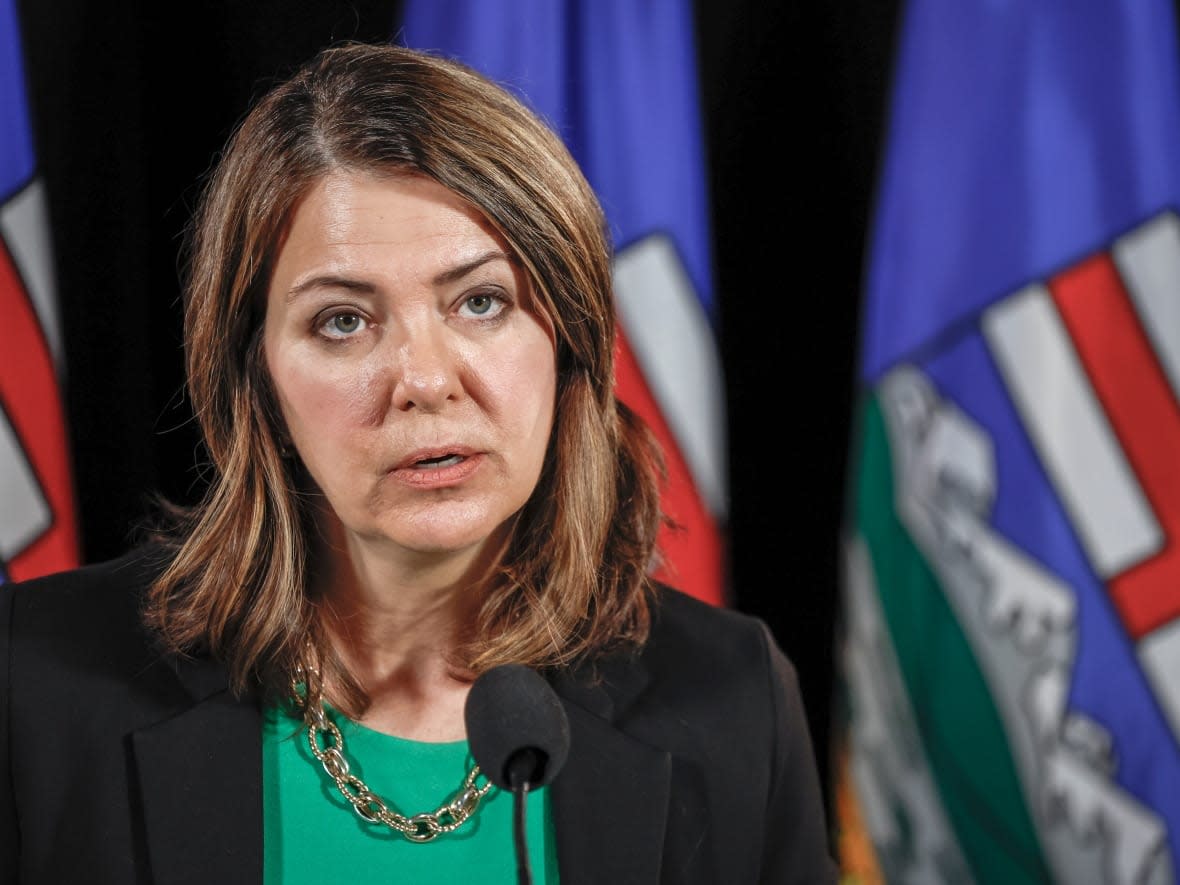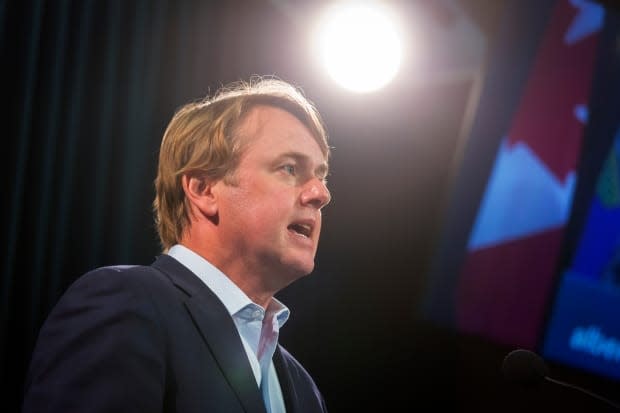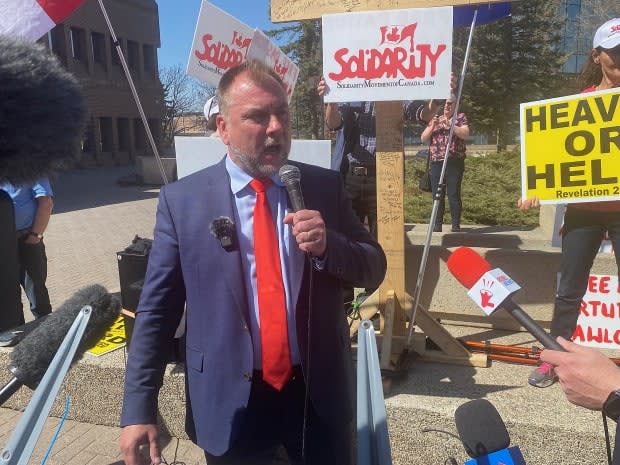Alberta Premier Smith breached Conflicts of Interest Act, says ethics commissioner

Alberta's ethics commissioner says Danielle Smith, in her capacity as premier, contravened the Conflicts of Interest Act in her interactions with the minister of justice and attorney general in relation to criminal charges faced by Calgary street preacher Artur Pawlowski.
Ethics Commissioner Marguerite Trussler's probe began March 31 after a member of the public asked if there were ongoing investigations into whether Smith pressured cabinet members or employees of the government in relation to the Coutts border blockade.
In her report, Trussler said three questions arose during the probe that needed to be answered:
Did someone from the premier's office send an email about the COVID-related prosecutions to a Crown prosecutor?
Was it improper for the premier to discuss [street pastor Pawlowski's] criminal case with him?
Did the premier interfere with the administration of justice in her interactions with the minister of justice and attorney general in his role as attorney general or anyone in his ministry in relation to the COVID-related prosecutions?
"In my opinion, Premier Smith contravened [section three] of the Conflicts of Interests Act in her interaction with the minister of justice and attorney general in relation to the criminal charges Mr. Pawlowski was facing," Trussler wrote in her report.
In January, CBC News reported that a staffer in Smith's office had sent a series of emails to the Alberta Crown Prosecution Service. Trussler wrote that she had found no evidence of emails and "could only come to the conclusion, based on the evidence that I have, that no Crown prosecutor was emailed directly about any of the cases."
"There appears to be no interference with the independence of prosecutors on this level," she wrote.
When it came to discussing Pawlowski's criminal case, she wrote that while Smith's telephone call with him was not a matter covered by the Conflicts of Interest Act, it was a breach of a principle that members of the legislative assembly should not speak with any accused person about any ongoing criminal matter before the courts.
Trussler wrote that she made no recommendations with respect to sanctions against the premier but reserved the right to make recommendations once the Legislative Assembly of Alberta was back in session.
Smith responds
In a statement posted Thursday to Twitter, Smith wrote that she had always sought "amnesty for those charged with non-violent COVID-related offences and violations during the pandemic" and wrote that "CBC and NDP had repeatedly lied to Albertans for months" about her office contacting Crown prosecutors.
As for her call to then justice minister Tyler Shandro, she said she was seeking advice.
"As I have explained before, I spoke with Minister Shandro, who is an experienced lawyer (I am not) as I was very interested in his advice on what could be legally done about this," she wrote.
Call to Shandro
In January, CBC News reported that Smith pressured Shandro and his office to intervene in COVID-related court cases, according to multiple sources familiar with the interactions.
CBC reported that Smith would ask for updates on cases or inquire whether it was possible to abandon them, specifically the prosecution of Pawlowski, a pastor who was then facing charges of two counts of criminal mischief and a charge under Alberta's Critical Infrastructure Defence Act related to the Coutts border blockade.
In her report, Trussler wrote that Smith called Shandro on Jan. 6 in the evening. During the call, the premier didn't advise Shandro that she had had a personal telephone call with Pawlowski, Trussler writes, and started the conversation by "stating that she did not know if it was appropriate to call him."
"She advised that he indicated that she could continue as the deputy minister shielded him from the COVID-related cases. While she says that she started to talk about the cases generally, at some point she turned to Mr. Pawlowski's case," Trussler writes. "It is important to note that this call was only a few hours after the Pawlowski call."
Shandro remembered a different version of the conversation, Trussler said. He did not recall the premier beginning the call by asking if it was OK for her to ask about the COVID-related prosecutions.
"He advised me that he never felt any such conversation would be appropriate and that he almost certainly would have not indicated it was OK to proceed," she said. "He remembered that there was a brief conversation generally about COVID-related prosecutions, but Premier Smith turned very quickly to Mr. Pawlowski's case, which Minister Shandro understood was the reason for the call."

Shandro also recalled that during the call, but not at the beginning of the call, Smith asked him about the extent to which he could get involved in a prosecution, Trussler wrote. Smith pointed out he was the attorney general, and seemed to suggest something that was influenced by a letter sent by Ezra Levant, who runs the right-wing media company Rebel News, she wrote.
In response, Shandro recalled that he tried to explain the role of the attorney general and said while the Crown prosecution service is under his authority, he could not personally get involved in files or speak to prosecutors. He made the point that there is a separation between his office and that of the prosecutors.
"Minister Shandro stated that Premier Smith was passive/aggressive throughout the call. She asked him specifically if there was anything he could do about Mr. Pawlowski's case," she wrote.
"She wanted him to make it go away, although she did not direct him to do so. She was concerned about a press conference that Mr. Pawlowski said he was going to have and how bad the optics would be for the party.
"Minister Shandro told her there was nothing that could be done, and she accepted his advice.
"There were no further conversations between Minister Shandro and the premier on this subject."

Trussler, citing the case of Prime Minister Justin Trudeau in the SNC-Lavalin case, wrote that Smith was the only person "who, by virtue of her position, could clearly exert influence over the attorney general, and had the power to remove [Justice Minister Tyler Shandro] from his position as minister of justice and attorney general."
"In the whole scheme of things, it is a threat to democracy to interfere with the administration of justice," she wrote.
"It is the first step toward the type of judicial system often found in a non-democratic or pseudo-democratic country where members of and friends of those in power are shielded from prosecution or are acquitted by the courts on the instructions of those in power.
"As well, those opposing the government face trumped up charges and are convicted based on political instructions to the judiciary which slavishly follows the government agenda in order to keep their positions. This independence is a cornerstone of any democratic society and democracy will fail without it."
Crown Prosecution Service emails
CBC News's January story reported that a staffer in Smith's office had sent a series of emails to the Alberta Crown Prosecution Service, challenging prosecutors' assessment and direction on cases stemming from the Coutts border blockades and protests.
"CBC admits it has not seen the emails and has not revealed the source who provided the story," Trussler wrote. "The person who was alleged to have sent one, or perhaps more, of the emails was incensed by the allegations and denied them."
CBC News never named an individual in its reporting, citing multiple sources.
"As we have maintained all along with this story, CBC News stands by our journalism and our sources. We would also note the Commissioner did not search for additional emails," wrote CBC spokesperson Chuck Thompson, in an email in response to a request for comment about the report's release.
All 44 Crown prosecutors who had Coutts or COVID-related files provided a statement that they did not receive any contact relating to their files from the premier's office, and all 32 political staff members in the premier's office, at the relevant time, provided a statement, Trussler wrote.
"I think that it can be said that the members of the Crown Prosecution Service were annoyed and even incensed by the allegation that one of them had received outside political pressure. Assistant Deputy Minister Kim Goddard is confident no one in the Service received an email," she wrote.

The scope of the search conducted by the provincial government has left unanswered questions, particularly when it comes to keywords, deleted email policies and other details.
CBC News has previously reported that the government's email search took place Jan. 20-22 but has said deleted emails have a retention period of 30 days, and once an email is deleted by a user it would still be accessible for 30 additional days. That's a total of 60 days.
But that means that any emails that were deleted before Nov. 21, 2022, would not have been accessible during the government's search. According to sources, the emails were sent before Nov. 10, 2022.
"The email search was fairly reasonable given the time parameters in which it was done. A more thorough search would have taken considerably more time and would have been costly," Trussler wrote in her report.
In her statement on Twitter, Smith wrote that she was "gratified" to read Trussler's conclusions on the emails.
"Both the CBC and the NDP should apologize and withdraw those false accusations immediately and publicly," Smith wrote.
Report's conclusion
In the report's conclusion, Trussler recommended that all new members of the legislative assembly attend mandatory training upon election about the structure of Canadian government and the roles of the three branches of government.
Of the 85 requests for investigations sent to Trussler in 2021-2022, she conducted only one probe, according to the commissioner's last annual report. That investigation focused on Education Minister Adriana LaGrange and cleared her of inappropriate conduct tied to a $150,000 contract for students' reusable masks granted by her ministry to a company in her Red Deer riding.
Some of Trussler's investigations were completed within a month, but typically the commissioner took between three and eight months.
Read the full report here.


